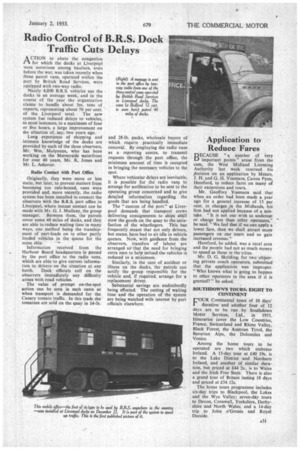Originally, they were more or less static, but later, to
Page 33

If you've noticed an error in this article please click here to report it so we can fix it.
prevent matters from becoming too rule-bound, vans were provided and, more recently, the radio system has been installed to connect the observers with the B.R.S. port office in Liverpool, where instant contact can be made with Mr. G. J. Mullany, the group manager. Between them, the patrols cover some 40 miles of docks, and they arc able to-reduce waiting time in many ways, one method being the transhipment of part-loads on to other partly loaded vehicles in the ,queue for the same ship.
Information received from the Harbour Board headquarters is passed by the port office to the radio vans, which are able to give current information to drivers, on the situation at any berth. Dock officials call on the observers immediately any difficulty arises with road vehicles.
The value of prompt on-the-spot action can be seen in such cases as when transport is demanded for the Canary tomato traffic. In this trade the tomatoes are sold on the quay in 14-1b. and 28-1b. packs, wholesale buyers of which require practically immediate removal. By employing the radio vans as a reporting centre, to transmit requests through the port office, the minimum amount of time is occupied in bringing the necessary vehicles to the Spot.
Where vehicular delays are inevitable, it is possible for the radio van to arrange for notification to be sent to the operating group concerned and to give detailed information regarding the goods that are being handled.
The "custom of the port" at Liverpool demands that transport crews delivering consignments to ships shill stow the goods on the quay to the satisfaction of the wharfingers. This has frequently meant that not only drivers, but mates, have had to sit idle in vehicle queues. Now, with guidance from the observers, transfers of labour are arranged sti-that the need for bringing extra men to help unload the vehicles is reduced to a minimum.
Similarly, in the case of accident or illness on the docks, the patrols can notify the group responsible for the vehicle and, if required, arrange for a replacement driver.
Substantial savings are undoubtedly being effected. The cutting of waiting time and the operation of the system are being watched with interest by port officials elsewhere.




















































































